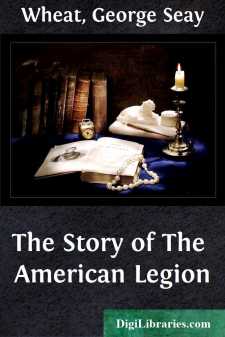History
- Africa 30
- Americas (North Central South West Indies) 50
- Ancient 68
- Asia 58
- Australia & New Zealand 8
- Canada 41
- Caribbean & West Indies 1
- Civilization 20
- Eastern Europe 12
- Europe 310
- Expeditions & Discoveries 60
- General 77
- Historical Geography 1
- Jewish 9
- Latin America 3
- Medieval 8
- Middle East 14
- Military
- Revolutionary 8
- Study & Teaching 5
- United States 353
- Western Europe 56
- World 13
Military Books
Sort by:
CHAPTER I LATTER WAR DAYS IN FRANCE I believe that the army of to-day, when it goes back to citizen thinking and citizen acting, will be capable of so contributing to the commonwealth of the United States as to change the character of the whole country and lift it up to a higher plane. BISHOP BRENT, Senior Chaplain, A.E.F. Paris, March, 1919. On a midsummer morning in 1918, ambulance after...
more...
by:
William McKinley
William McKinley William McKinley, the twenty-fifth President of the United States, was born in Niles, Trumbull County, Ohio, January 29, 1843. His ancestors on the paternal side, who were Scotch-Irish, came from Scotland and located in Pennsylvania. His great-grandfather, David McKinley, after serving in the Revolution, resided in Pennsylvania until 1814, when he went to Ohio, where he died in 1840,...
more...
This is one of the best books that has appeared about the war. It shows conclusively why the United States must put this war through to a finish, and why every good American and every believer in liberty and civilization must be heart and soul against Germany. The fact that Mr. Kahn himself is of German origin emphasizes the contention which every good American should make, namely, that the Americans...
more...
PREFATORY CHAPTER This new edition has been carefully revised throughout, and, as far as possible, brought up to date by noting, in their proper places, the chief events of importance that have occurred since the book first appeared. In the historical chapters, however, and in those which deal with recent politics, no changes have been made save such as were needed for the correction of one or two...
more...
by:
Louis Creswicke
CHRONOLOGICAL TABLE—Vol. II. OCTOBER. 11.—Boer Ultimatum time-limit expired. Great Britain commenced to be at war with Transvaal and Orange Free State. 12.—Text of Great Britain's reply to Boer Ultimatum issued. It stated that the conditions demanded were such as her Majesty's Government deemed it impossible to discuss. Mr. Conyngham Greene recalled. Armoured train captured by Boers...
more...
INTRODUCTIONWRITTEN largely between the shipping crisis of 1917 and the surrender of German undersea arms at Harwich on November 20, 1918, this book is an effort to record a seaman's impressions of the trial through which the Merchants' Service has come in the war.It is necessarily halting and incomplete. The extent of the subject is perhaps beyond the safe traverse of a mariner's dead...
more...
by:
Raphael Semmes
CHAPTER I. The Question at issue—An unexpected point of attack—Captain Semmes—The President's instructions—Creating a navy—From the old to the new—An important mission—Appointed to the Sumter—True character of the Confederate "pirate." The President of the American States in Confederation was gathering an army for the defence of Southern liberty. Where valour is a national...
more...
by:
Hall Caine
THE INVISIBLE CONFLICT Mr. Maeterlinck has lately propounded the theory {*} that what we call the war is neither more nor less than the visible expression of a vast invisible conflict. The unseen forces of good and evil in the universe are using man as a means of contention. On the result of the struggle the destiny of humanity on this planet depends. Is the Angel to prevail? Or is the Beast to prolong...
more...
by:
C. H. Thomas
INTRODUCTION Apart from the progress of the present Anglo-Boer war a world-wide interest has been excited also upon the question of its actual origin. Much disparity of opinion prevails yet as to how it was provoked and upon which side the guilt of it all lay. English statesmen of noblest character and best discriminating gifts are seen professing opposite convictions; one party earnestly asserting the...
more...
INTRODUCTORY CHAPTER. At the present day, when our Continental neighbours are outvying each other in the completeness of their military organisations and the size of their armies, while in the United Kingdom complaints are daily heard that the supply of recruits for the British Army is not equal to the demand, it may not be out of place to draw the attention of the public to a source from which the...
more...











